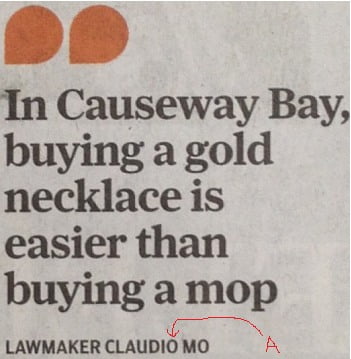 I did very well out of jewellery chain Chow Sang Sang, buying it at around $6 a share and selling it at over $20 when the number of Mainland shoppers coming to Hong Kong started turning into a flood. While I held the stock, I felt pretty good seeing new branches open and more customers pouring in to buy the shiny baubles. I could even stomach the loathsome puke that passed as the company’s marketing on the grounds that, hey – if it works… But soon after selling, I developed a deep hostility to the phenomenon of Mainland visitors and the outlets aimed at them displacing residents and their traditional retailers.
I did very well out of jewellery chain Chow Sang Sang, buying it at around $6 a share and selling it at over $20 when the number of Mainland shoppers coming to Hong Kong started turning into a flood. While I held the stock, I felt pretty good seeing new branches open and more customers pouring in to buy the shiny baubles. I could even stomach the loathsome puke that passed as the company’s marketing on the grounds that, hey – if it works… But soon after selling, I developed a deep hostility to the phenomenon of Mainland visitors and the outlets aimed at them displacing residents and their traditional retailers.
It would probably have happened anyway, just as it happened to most other people (the first anti-‘locust’ protests started within a year, as I recall). But there is no denying the fact that the presence or lack of a financial interest helps shape your outlook. So it may well be that the retail lobby are sincere in believing that a reduction in visitor numbers would do huge damage to the Hong Kong economy, as they are now claiming in response to Chief Executive CY Leung’s comments about cutting arrivals by 20%.
The landlords’ arguments are nonetheless self-serving. With tight supplies of both labour and commercial space, the massive influx of Mainland shoppers has simply squeezed other jobs and businesses out. You only have to look at how median household income has largely stayed flat for the last 10 years to see that only a few are making more money from this, while the rest suffer tremendous annoyance and inconvenience. We should also consider the possibility that the sharp rise in rents could do permanent damage to Hong Kong by killing off smaller businesses and opportunities for innovative entrepreneurs, thus further narrowing our economic base. Basically, we need all the ‘pharmacies’, jewellers, cosmetics and other shops that opened over the last five years to shut.
The idea that the government could even mention a cut in numbers has freaked out the vested interests. So accustomed are they to an administration that serves them and not the population as a whole, that we see denial and cognitive dissonance setting in. Today’s Standard editorial tries to make sense of it thus…
That’s right: the ‘20%’ idea is a government scare tactic to get complacent landlords off their backsides and join officials in battling the rest of the community, which  idiotically opposes the swarms of Mainland visitors. In your dreams. The government is under siege on this issue, and it would probably sooner form an alliance with the rest of the population against the landlords than vice-versa.
idiotically opposes the swarms of Mainland visitors. In your dreams. The government is under siege on this issue, and it would probably sooner form an alliance with the rest of the population against the landlords than vice-versa.
Not that we will see that, sadly. The issue concerns face (CY played a role in convincing Beijing to let more Mainlanders visit Hong Kong). It concerns public opinion across the border, where many people now feel a right as fellow citizens to access cheaper/safer Hong Kong goods and would resent Beijing pandering to the spoilt and selfish colonial running dogs . But, looking on the bright side, it also concerns popular feeling in Hong Kong, which never seems to manifest itself as undying love for Party and Motherland, whatever carrots and sticks are waved at it. This is why Beijing’s officials in Hong Kong picked up the Individual Visit Scheme issue a few months back and said they’d study it, by which they mean ‘defuse’.
It will be interesting to see who hands down the final decision on what to do. The more it is seen to come from officials at the national level (which is where authority over exit permits for Hong Kong lies), the less the ‘patriotic’ shoe-shiners of the retail/landlord lobby will be able to whine. Indeed, the rest of the population will on balance probably have more respect for anything coming from Beijing than from CY and his team. Either way, Beijing will have a big say, and its officials already have some experience of this, micro-managing how often Mainlanders can visit Macau. One elegant solution would be for the Chinese government to cut import and sales taxes on foreign and luxury goods, which would reduce incentives to shop here at a stroke, but presumably also cost revenue and damage protectionist interests. The outcome, handed down in that ‘we never forget to show you who’s boss’ manner, may well be one that pisses off everyone – which is CY’s 20% cut in a nutshell.


